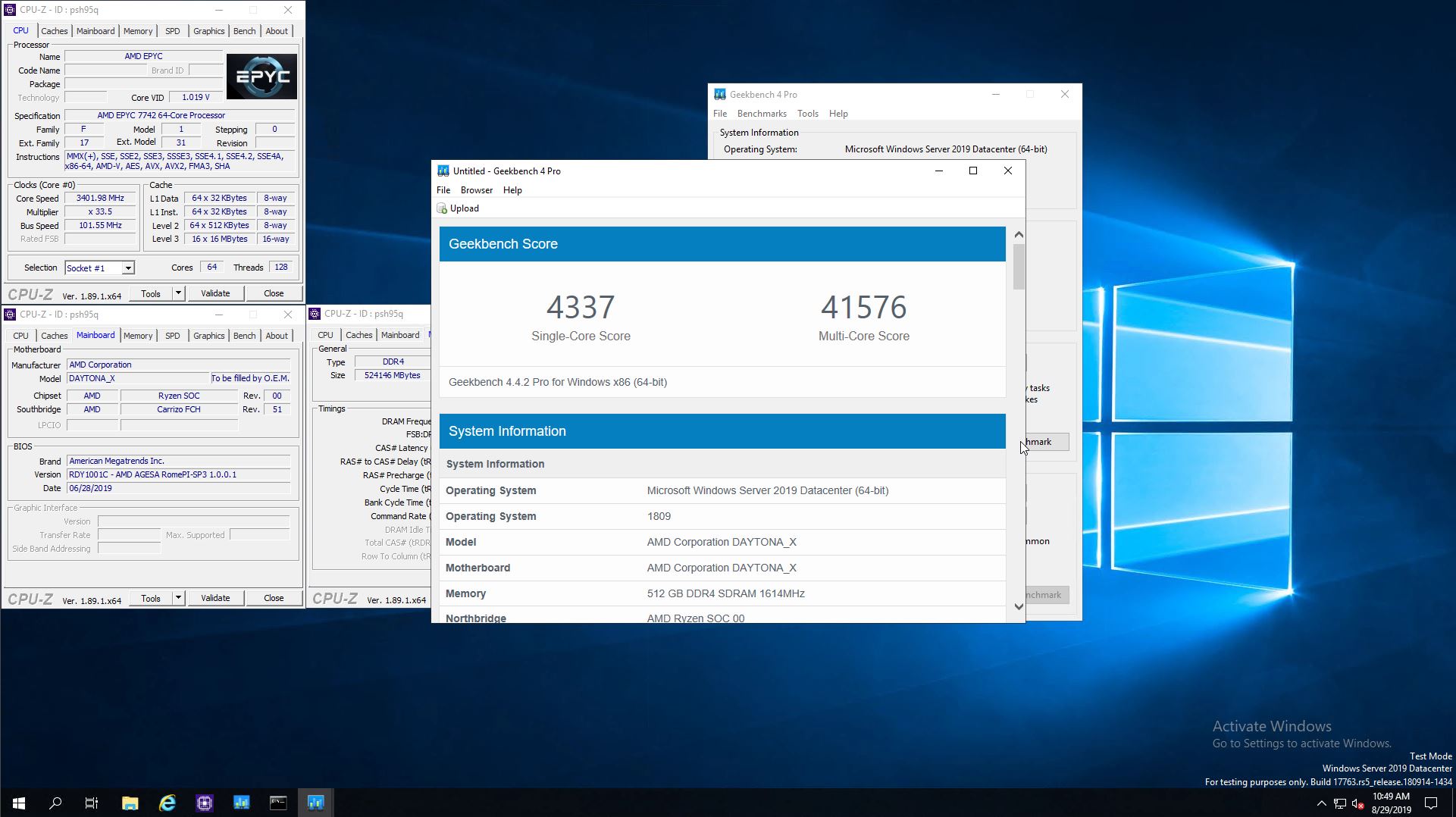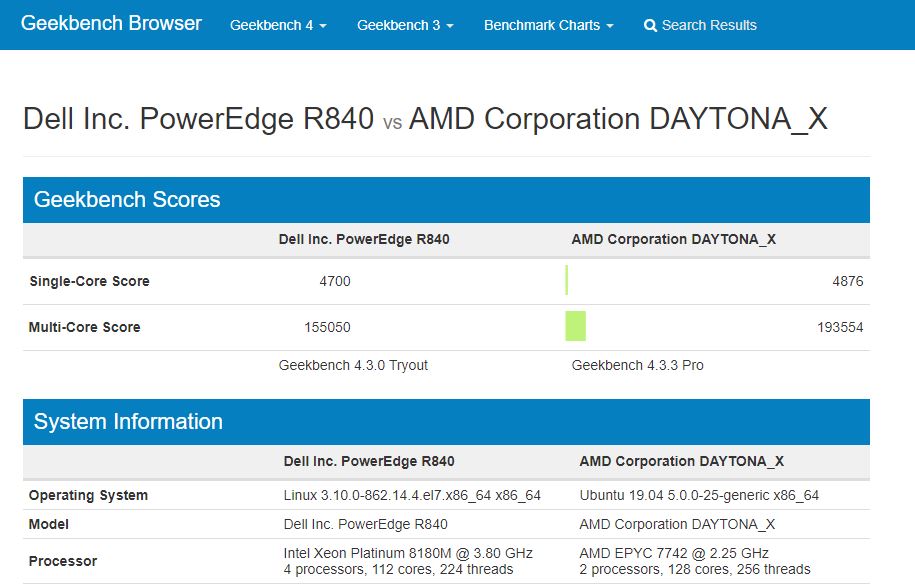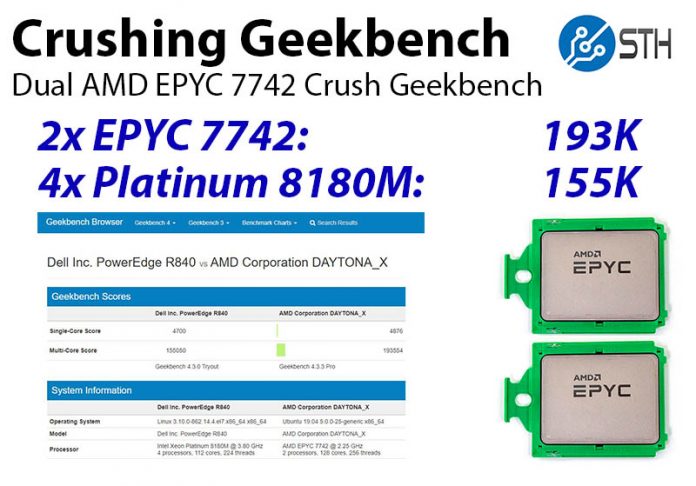Heading into this holiday weekend, we have another fun one outside of our normal test suite. Recently we released our Crushing Cinebench V5 AMD EPYC 7742 World Record Edition. Since that video, we have been asked numerous times for a Geekbench version. We ran into a few issues, but we managed to get some fairly eye-popping results. Geekbench is not something we typically run on servers, but we were asked, and a holiday weekend was coming so it was time for some fun.
Geekbench 4 Using Windows Server 2019
Officially for HWbot’s world records, you need to use Windows to get validation screenshots. We ran Geekbench 4 using Windows Server 2019 and got abysmal results. Here is the result.

We were even using a newer version of Geekbench 4.4.2 Pro (as well as Geekbench 5 beta) and still the results were less than great. Since the result seemed way out of line, we contacted John Poole at Primate Labs about what we were seeing.
His response was that the Windows version of Geekbench hits in the Windows memory allocator on high core count (>16 cores) systems and with 128 cores/ 256 threads, we were seeing symptoms of that. He also noted that Geekbench 4 is not managing NUMA itself.
With that, we abandoned our attempt at a HWbot world record, and turned to Linux and setting the world record on the Geekbench browser. There is nothing like hitting modified goals!
Geekbench 4 Obliterated by AMD EPYC 7742
There are a number of quad-socket Intel Xeon Platinum results on the Geekbench browser. Notably, all of those are done in Linux. Since we had Ubuntu 19.04 installed on another drive in the machine, we simply rebooted and ran the Linux version of Geekbench 4.
We ran the benchmark a few times and most of the results were in the 183,000 to 188,000 range. On the second run, however, we saw something bigger. A 193,554 multi-core score. For context, there was an 8-way Lenovo ThinkSystem SR950 with Xeon Platinum 8168’s that seems to be underperforming what we would expect here. The top result was a Dell PowerEdge R840 with quad Intel Xeon Platinum 8180M CPUs you can see here. That quad Platinum 8180M configuration had a score of 155,050.

That puts the dual AMD EPYC 7742 system squarely in the world record spot. As a quick note, we are using the AMD reference platform. As major vendors come out with their production 2P AMD EPYC 7002 servers, we expect this will be broken. We also did nothing other than run the executable to tune the system so there is surely room for improvement. 200K will be broken with dual AMD EPYC 7742 processors.
Here is the video on the run:
Final Words
A 20-25% performance gain for the dual AMD EPYC 7742 system over the quad Intel Xeon Platinum 8180M configuration is good. One should remember that a quad Plaintum 8280 system has slightly higher clock speeds. We are comparing 4 CPUs to 2 which is not exactly a win for Intel here. Aside from performance, the EPYC 7742 also has more memory capacity and PCIe bandwidth than the quad Intel Xeon Platinum 8180M all while using less power and carrying a lower sticker price. Geekbench 4 probably figures into about zero server RFPs so it is a nearly meaningless number at this end of the computing spectrum. Still, heading into a holiday weekend, it seemed like a fun number to show our readers that asked to see it.





STH: Happy Laborday Intel!
So happy to see this. Happy to see AMD win. Thanks sth and Patrick.
Computing industry will benefit from this competition for at least half a decade, this is good for humanity in general!
Here’s the link to the actual comparison page:
https://browser.geekbench.com/v4/cpu/compare/14486381?baseline=10704888
Please, cinebench on quad platinum again
Can you run the new geekbench 5 test to see if that scales better in windows and linux?
Already done. Linux scales better than Windows to the point that the Linux results were interesting and Windows is less so. 128->256 threads has similar scaling limits with GB5 as GB4.
Considering RFPs, while it’s probably true that benchmarks don’t contribute directly, they often play an important role of a ballpark estimate to see if a certain upgrade is viable at all.
I’m at awe at how important the Linux kernel version is: 7502P improves its score by some 20% after an update from 4.9.whatever to 4.19.whatever; the AES benchmark seems to be practically single-threaded in the older kernel:
https://browser.geekbench.com/v5/cpu/compare/24535?baseline=24156
I saw that and have been trying to replicate your 4.19 numbers on Ubuntu 19.04’s 5.0 kernel and cannot on the same setup. Did you play with any BIOS settings?
Nope, everything straight from the vendor.
It’s a bit strange that GB5 doesn’t list memory configuration, but it’s running 8x SKHynix MHMA84GR7CJR4N-XN (3200, 22-22-22). What’s yours?
The only other tuning I’ve done is probably the “performance” cpufreq governor: that increases the score from ~40500 to ~41500.
Interesting. My results went down by ~500 with that set to -g performance.
Hi Patrick
Can I ask what memory configuration you have on this system? What size DIMMs? DDR4 or DDR5? Also, what NUMA config do you have? Thanks!